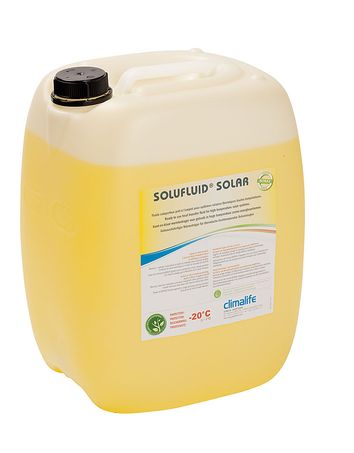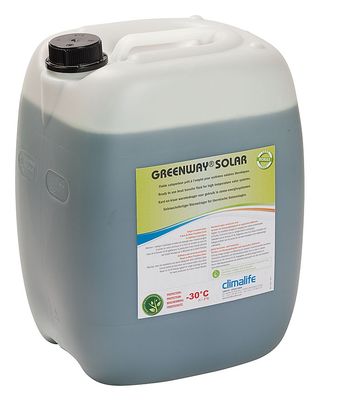The growing popularity of solar thermal technology has brought new challenges to the quality standards of the heat transfer fluid (HTF) used – the real "lifeblood" of the installation – particularly in ageing and temperature resistance.
Specialists in the formulation of HTFs over the past 30 years, Climalife have devoted two years of research to responding to 3 key needs:
– investigating efficient and sustainable heat transfer
– reducing premature ageing at high temperatures or during periods of overheating
– preserving the installation’s ROI at all costs
Let’s look in more detail at the various applications and the solutions which best meet their needs:
1. For installations where constraints are mastered: where the use is continuous throughout the year, correctly sized or presenting large discharge capacity (eg swimming pool):
 Solufluid® Solar – the market’s classic HTF:
Solufluid® Solar – the market’s classic HTF:
- Ready-to-use formula based on propylene glycol (MPG)
- Frost protection and long-term corrosion resitant
- Approved by French Health Ministry, this product is biodegradable
2. For installations with strong constraints: vacuum tubes, oversized, subject to periods of non-use (schools in summer holiday etc), with repeated overheating periods. In this instance the ageing of a MPG-based HTF will be quick.
For new installations: prevention is better
 Greenway® Solar : the bio-chemical alternative to petrochemical glycols:
Greenway® Solar : the bio-chemical alternative to petrochemical glycols:
- Based on Bio-PDO, 100% of vegetable origin
- Approved by French Health Ministry, a highly biodegradable product
- Expansion and degradation 3 times lower at 150°C vs MPG
- Highly stable over time
- Unique product on the European market
For existing installations: cure and prevent
SolRnett : the new internal cleaner which can increase a system’s lifespan.
– Restores circulation
– Avoids replacement of collectors
– Effective at room temperature, or heated
Climalife recommends the use of a specialist heat transfer fluid such as Greenway® Solar !
Indeed, a major problem but one which not enough is known about: premature ageing.
More and more reports show systems in default because of the premature ageing of MPG-based heat transfer fluids. It results in a darkening in colour, an increase in acidity, a decrease in thermal exchange efficiency, an increase in viscosity, and even ultimately a total caramelisation, avoiding any circulation at all, which in turn leads to the need to replace the solar collectors. The system’s ROI will suffer as a result. This outcome can be prevented however, with the use of a specialist cleaning product such as SolRnett.
Very often when this situation occurs, the system is returned to service and the MPG-based heat transfer fluid is replaced by another MPG-based heat transfer fluid which will result is exactly the same problems!

